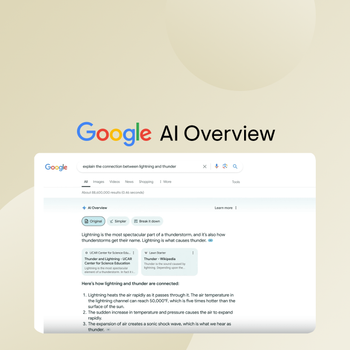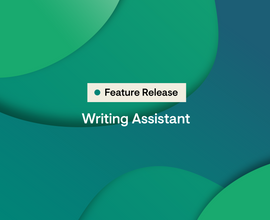AI Overviews in Google Search: 6 Strategies for SEO Success
- Thought Leadership
- By Patrick Reinhart
- 9 minutes read
Google's AI Overviews are here. Learn 6 SEO strategies to adapt and thrive, covering E-E-A-T, content and ranking shifts, and more.
With Google's announcement at Google I/O to roll out AI Overviews (formerly part of their experiment known as Search Generative Experience, or SGE) to all US searches, there’s understandable anxiety and tension across our industry. Having closely followed this since the launch of the SGE beta, it’s clear the time has finally come where this will be the new normal.
Is this change going to displace traffic? Maybe. We simply don’t know yet and we can’t make concrete assumptions until we actually see something happen.
The big question everyone has is, “So, Pat, what do I do?”
To answer this, I believe there are six things that will help you not only survive, but thrive in this new world. I’ll start with a summary of the key points—read on for the full breakdown:
1. Stay Calm and Adapt: Historically, major disruptions have not eliminated the need for SEO but have instead propelled it forward. Viewing this as an opportunity for upskilling and adaptation can position professionals and organizations ahead of the curve.
2. Educate Leadership: Convey the potential impact of AI Overviews on search traffic to organizational leaders to set expectations. Transparency will lead to shared responsibility, resourcing, and proactive planning.
3. Focus on Content Specificity: Broad content is no longer sufficient. Focus on detailed, topic-specific content that answers user queries comprehensively to align with Google's passage-based ranking.
4. Emphasize E-E-A-T: Highlight authorship by connecting content to credible, authoritative individuals within your organization. E-E-A-T (experience, expertise, authoritativeness, and trustworthiness) must be clearly demonstrated.
5. Redefine SERP Rankings: Recognize that the concept of what a ranking is will shift. Think more broadly about how your website’s visibility in SERPs extends to various platforms and content types.
6. Adopt an “Always-On” Mentality: Transition to an automated, technology-driven approach for continuous SEO optimization. Build agile, cross-functional teams to drive efficiency and adaptability.
1. Stay calm and SEO on
Over the course of my 20-year career, I have had several “meteors” come for my job. Have they been impactful? You bet. Did they have a seismic impact on the SEO industry? Yep. Did they kill SEO? Not one.
The truth is that every time there has been a major industry change, it has mostly benefited the SEO industry and the individuals within it. You should view this as a major opportunity to upskill yourself and your team.
Embrace the change. After all, there is new real estate up for grabs on the SERP and the best will be those that quickly adapt and learn how to stake out their claim of the new AI Overview.
2. Educate your organization & leadership immediately
If you haven’t already, create a presentation to educate the right players and leaders about this change. There is a likely chance we’ll see some amount of traffic displaced as a result, but you should not get the blame. This change will affect everyone, so ensure those you report to and the organization as a whole understands the implications of this change and the plan moving forward.
In the Conductor Intelligence platform, there are a few methods to begin tracking this impact. Across our reporting features, the platform automatically detects and tracks changes to your content, as well as widespread industry changes–like Google algorithm updates. This gives you a definite point of reference to compare various performance metrics (website analytics, Google Search Console, etc.) and create custom reports to monitor your top keywords and pages.
You can also track your AIO visibility and pinpoint which terms these results are appearing for in our Explorer and Market Share features to pinpoint valuable terms and find opportunities to outrank competitors. Check out our blog to stay up to date on all of our AI Overview capabilities.
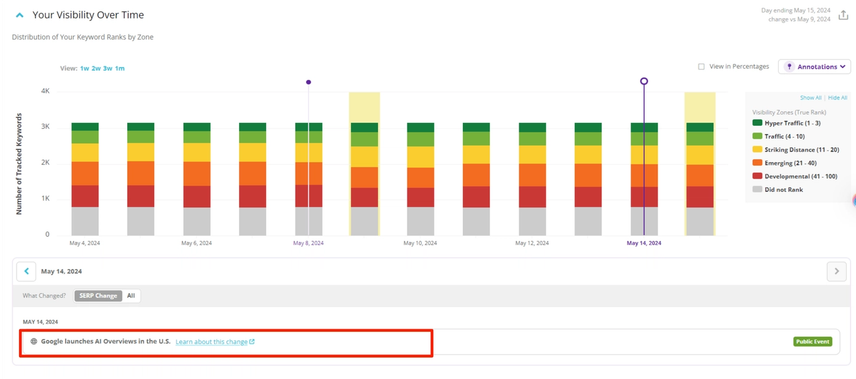
(If you're a customer, reach out to your Conductor team; we’ve been guiding many through this over the past 9 months and are happy to do the same for you.)
3. Be more specific when you write content
Google seeks the best possible answer to user queries, whether it be from a comment on a forum, snippet from an article, or passage from an FAQ–it’s advantageous to get down into the details. For instance, if you’re a retailer writing about wetsuits, don’t just say they’re great. You should also discuss temperatures, conditions, thickness, etc.
Google has broadened its use of passage-based ranking (which I love). Instead of bringing you to a page as a whole, the citation links in the current AI Overviews jump you to a specific, highlighted passage:

Google is looking for what they are calling “hidden gems” within your content. Ensure you’re answering the specific questions and hitting on the points that users are searching for.
In Conductor Intelligence, our AI-powered “Questions to Answer” insight within the Content Guidance and Writing Assistant features surfaces the most important topics people are searching and evaluates how well your content addresses these topics. Get clear guidance on what “hidden gems” to include to optimize your visibility in both the People Also Ask results and the new AI Overview box.
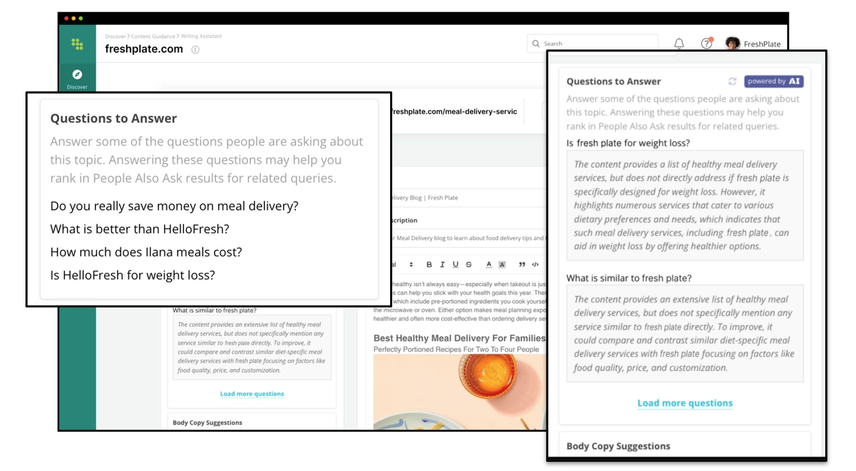
4. E-E-A-T matters, and authorship is back
E-E-A-T (experience, expertise, authoritativeness, & trustworthiness) has become Google’s core mantra. One crucial way of addressing this is making sure Google can identify and connect authoritative figures to your content. Being able to showcase first-hand experience and expertise has become a necessity vs. a nice to have.
This does not mean Google is credentialing people in your organization, but rather they are looking to see if you have built a clear path for users to understand why someone is an authority. They want to see the breadth of that individual’s contributions and expertise around a certain topic within the index. It’s very important to understand the difference between these two things as you are building this out.
It’s also very important to actually implement. It’s not a small project, but a very doable one.
Below are questions that Google wants to answer in order to establish these connections clearly, along with an example of my author page (with my very tired-looking headshot) on conductor.com:
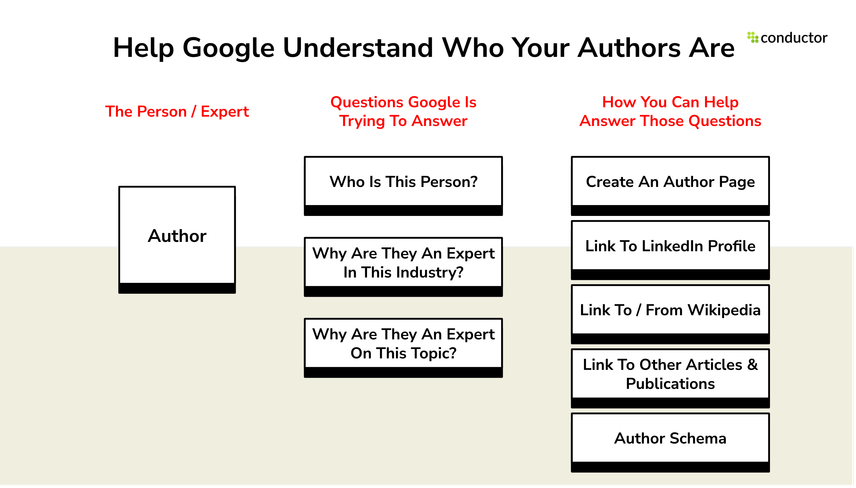
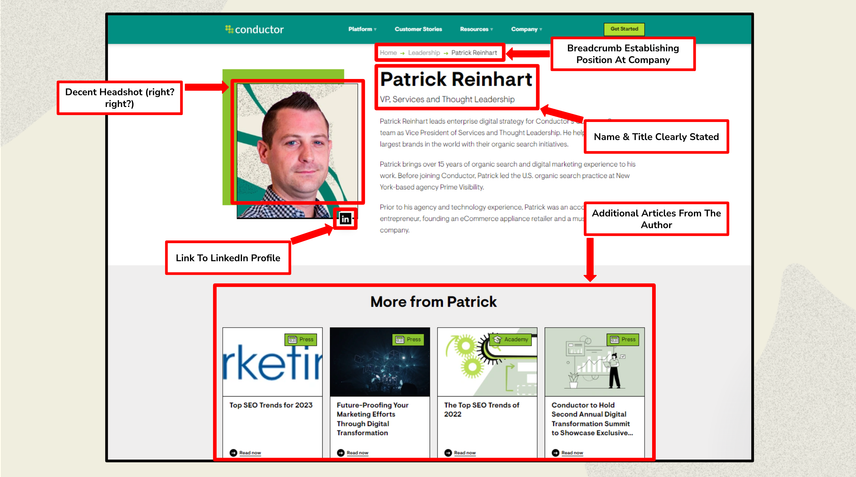
With Conductor Website Monitoring, you can set up custom element tracking to ensure these key factors related to authorship are properly in place. Not only that, but your pages can be segmented by author to understand what’s performing best and where there is opportunity to improve. If anything goes awry, including within the structured data, your team gets alerted in real-time.
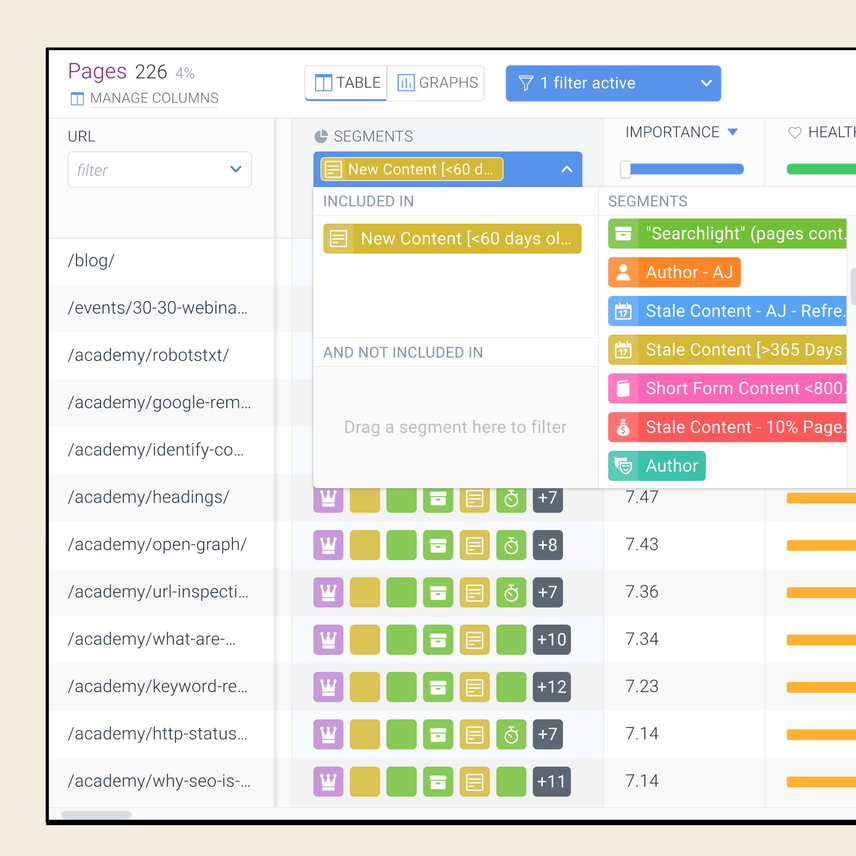
5. Ranking vs. real estate
The concept of ranking will change with AI Overviews. Is it a citation link? Is it the three links in the upper right corner? Which of these is considered #1? There’s no real answer to this yet, but the change will certainly impact CTRs in a big way. Keywords are less powerful when Google can simply answer a question in the AI Overview box, resulting in a zero-click search, or end up taking up so much space with more links, diluting the volume of opportunity.
So how do we combat this? We focus on owning more real estate in the SERPs.
While your website is the central nucleus of your digital presence, there are multiple roads that can lead a user there or extend how they experience your brand. This includes People Also Ask, video results, image results, knowledge graphs, social posts, etc. Moving forward, we expect even more variety in search results. For example, nowadays tweets (not sure what they’re referred to now, call me retro) can rank as standard blue links. We’ve all seen the ridiculous, meteoric rise of Reddit (+200% top ten visibility in the past 12 months) . Video results are now popping up in the AI Overview box, complete with timestamps and specific product tags.
Simply said, expanding your efforts across the different formats and platforms that Google pulls into the SERPs becomes a crucial and complementary part in amplifying the visibility of your website homebase. Ensure that when a question relevant to your business arises, you answer it everywhere.
Below are some questions I often pose to folks to get your wheels turning:
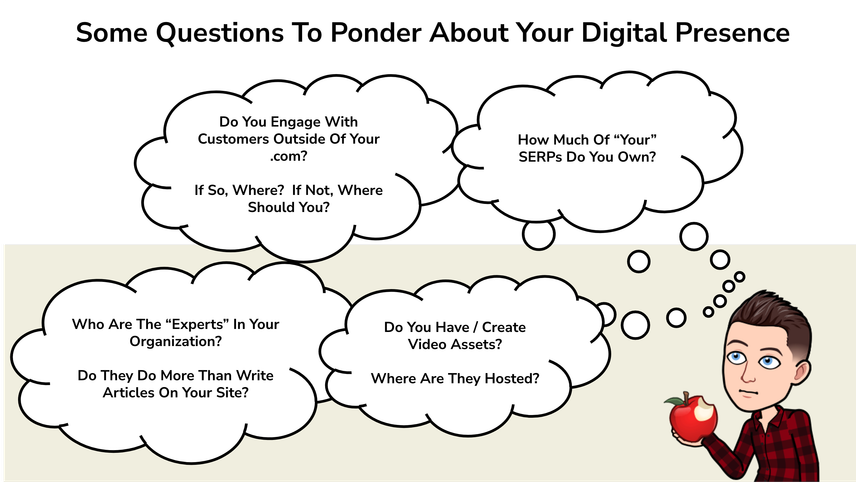
6. Adopting an “always-on” mentality
Last but certainly not least, it is about shifting away from reactive, button-pushing processes to a more automated, technology-driven, “always-on” approach. SEO is no longer a task for a singular role but a collaborative practice across growth-minded teams. SEO is a team sport, but the problem is that sometimes not everyone knows they are on the team. It’s important to create internal agility by streamlining processes and uniting teams, which can encompass not only your traditional SEO titles but also content, eCommerce / product, and web teams.
In a world where AI is rapidly evolving how everything works, the best way to keep up is to utilize AI yourself. The most successful SEO programs are technology-driven. If you’re still manually writing title tags or running site audits, you’ll be left behind. Equip content writers with impact-driven optimization techniques, including generative AI, and ensure they can measure the results of their efforts. Similarly, web dev teams should be empowered by technology to be able to monitor and fix site issues the moment they happen.
SEO is always on, so shouldn’t your processes match that? By leveraging AI, you can efficiently manage tasks 24/7 and stay competitive in this fast-moving landscape.
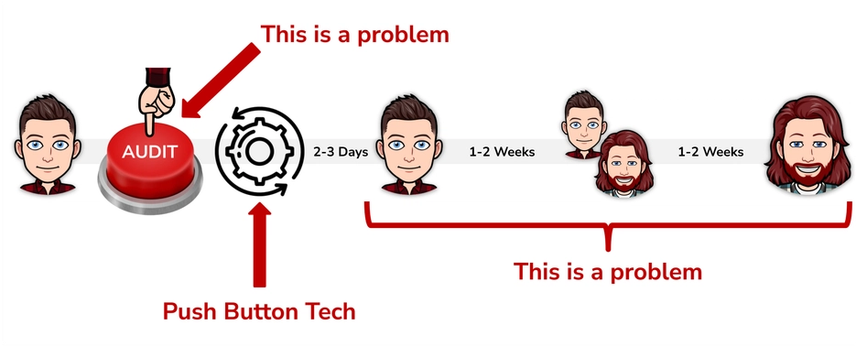
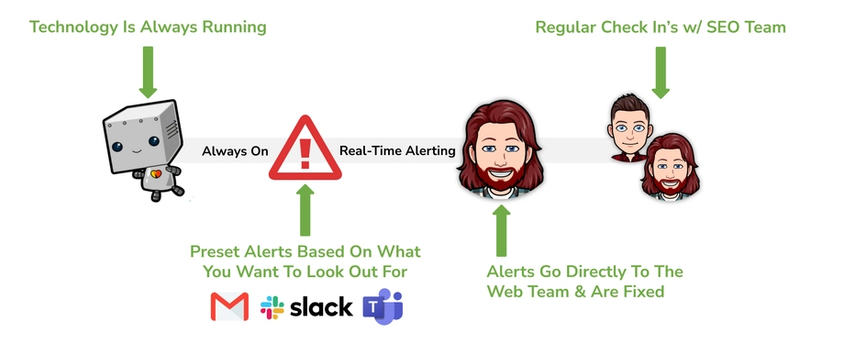
The path forward
For those that adopt this mentality and focus on upskilling, educating their organization, and adopting AI technologies, the opportunity is massive.
Will it be a little dicey in the short term? Yes, but it will be so for everyone. Challenges are unavoidable, but there’s a genuine opportunity to shape your programs and teams for the better for years to come.
If you are interested in hearing more about my thoughts on AI Overviews and the state of search in general, I invite you to join my next 30|30 webinar, which covers the last 30 days of industry happenings in 30 minutes. I look forward to seeing you there and having you join the conversation.
30 Minutes on the Last 30 Days In Search & Content
